- Hypoxia-inducible factor (HIF) 2α Inhibitors: belzutifan, NKT2152, ARO-HIF2
- Immune Therapies: Relatlimab, SRK-181, cytokines, CAR-T, novel CTLA-4 inhibitors
- Cytotoxics: Zanzalintinib, PRO1170 (CD70 ADC) theranostics
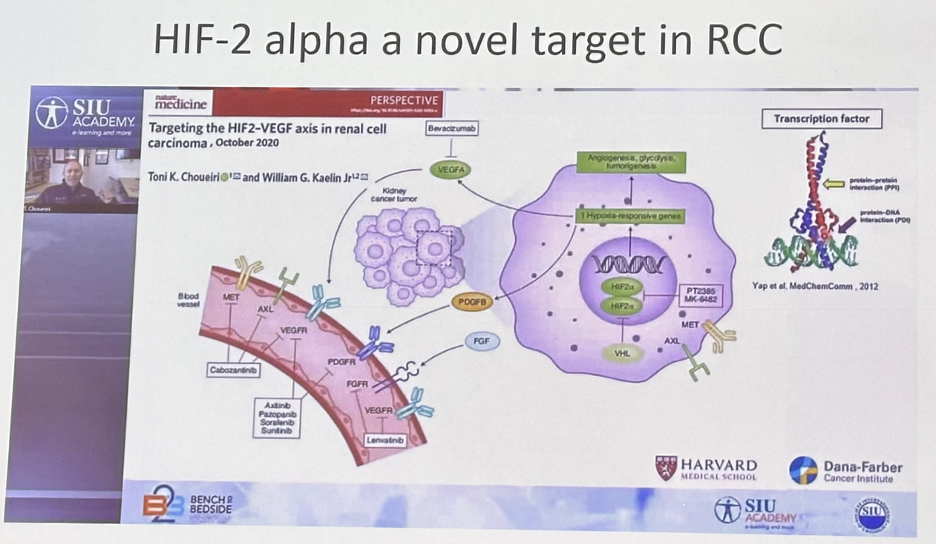
Significantly, in a phase 2, open-label, single-group trial in patients with RCC-associated Von Hippel Lindau disease, belzutifan was associated with an objective response rate of 49% for these RCC patients.2
More recently, the randomized open-label, phase 3 LITESPARK-005 study compared belzutifan to everolimus in patients with previously treated advanced clear cell RCC. This trial included patients with unresectable, locally advanced, or metastatic clear cell RCC. Patients had disease progression following 1 – 3 prior systemic regimens, including ≥1 anti-PD-(L)1 monoclonal antibody and ≥1 vascular endothelial growth factor receptor – tyrosine kinase inhibitor (VEGFR-TKI).
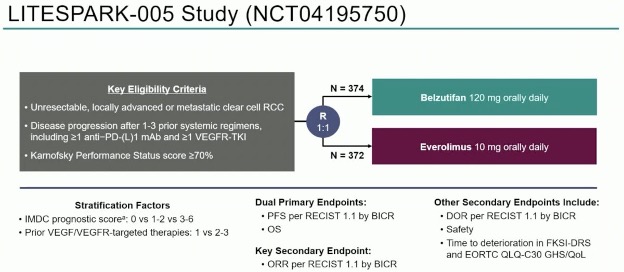
Presented recently at ESMO 2023 by Dr. Laurence Albiges, this trial met its co-primary endpoint of blinded independent central review-assessed (BICR) progression-free survival (PFS), as demonstrated in the Kaplan Meier curve below. At the landmark 18 months analysis, 22.5% of patients remained free of progression with belzutifan, compared to 9% with everolimus (HR: 0.74, 95% CI: 0.63 – 0.88).

To date, no overall survival benefits have been observed for belzutifan, compared to everolimus, in this study. While there is a signal for an overall survival benefit (HR: 0.88, 95% CI: 0.73 - 1.07, p=0.099), with 18 months survival rates of 55.2% and 50.6% for belzutifan and everolimus, respectively, to date this has not met statistical significance.
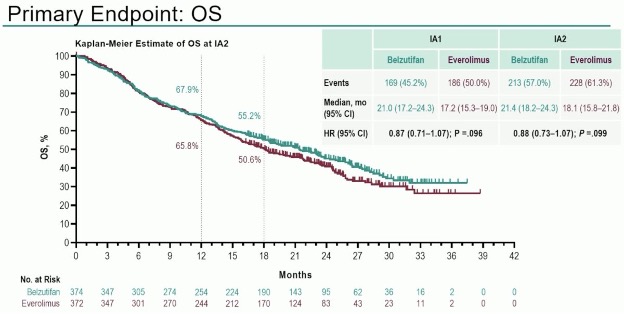
An ongoing phase II trial is evaluating neoadjuvant treatment with either pembrolizumab, belzutifan, or a combination of both in patients with locally advanced clear cell RCC.
Another novel agent being evaluated in this disease space is Zanzalintinib/XL-092, a multi-targeted tyrosine kinase inhibitor.
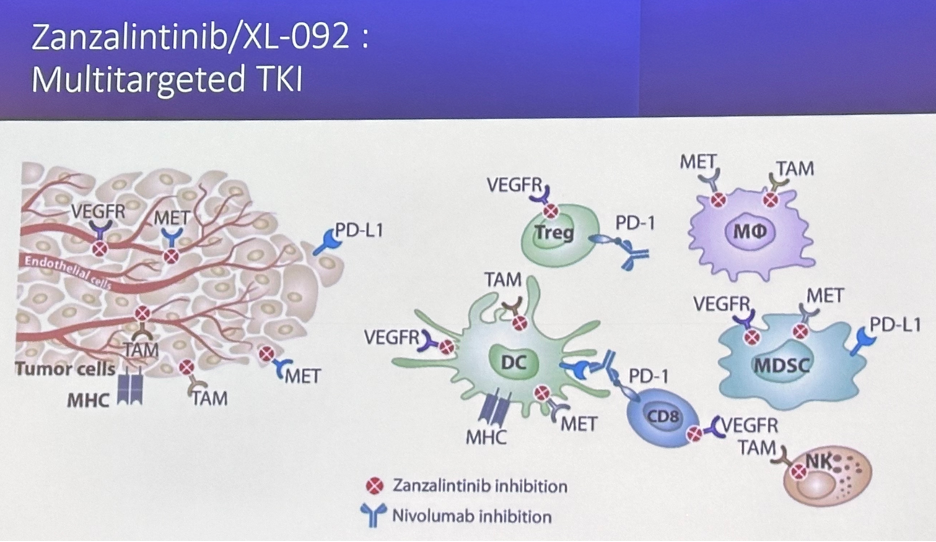
STELLAR-001 is evaluating zanzalintinib 10 to 140 mg daily in a dose escalation cohort of 49 patients with inoperable, locally advanced, metastatic, or recurrent solid tumors. This includes 32 patients with advanced, metastatic, or recurrent RCC with a clear cell histology, RECIST v1.1 measurable disease, and who had received 1 to 3 prior systemic anti-cancer therapies.
Dr. Sumanta Pal recently presented the results of this trial at the 2023 International Kidney Cancer Society (IKCS) meeting, with response rates of 57% and 25% in cabozantinib-naïve and exposed patients, respectively.
Among the 32 clear cell RCC patients, the objective response rate was 38% and the disease control rate was 88%.
STELLAR-304 is an ongoing trial in the non-clear cell RCC disease space that is randomizing patients with previously untreated, unresectable, advanced, or metastatic non-clear cell RCC (N=291) in a 2:1 fashion to either zanzalintinib + nivolumab or sunitinib. This trial has dual primary endpoints of PFS and ORR, assessed via blinded independent central review.
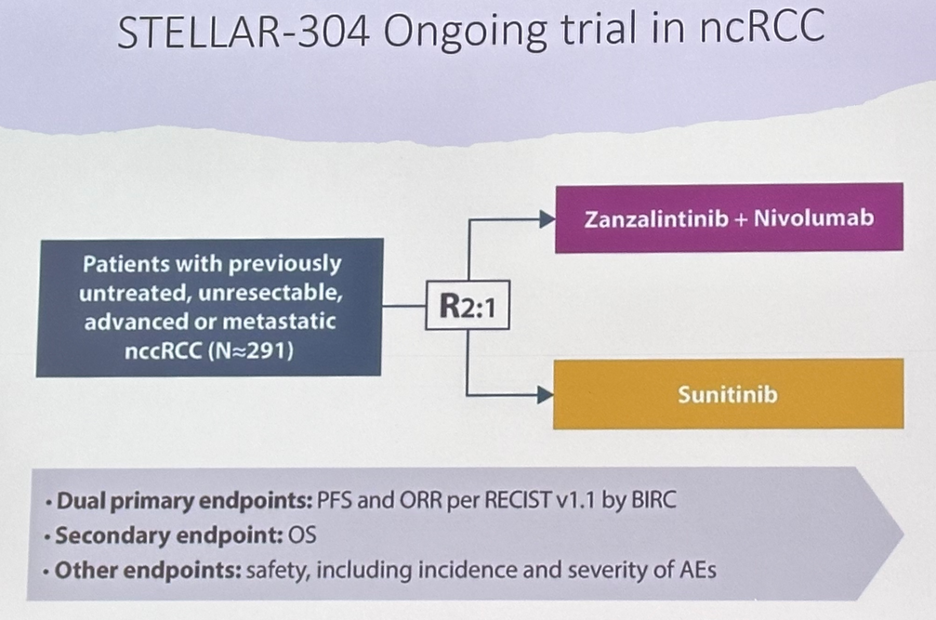
How can we potentially improve on contemporary immune therapy outcomes in advanced RCC? Cytoreductive nephrectomy and the microbiome may be two possibilities in this setting.
The SWOG 1931/PROBE trial is evaluating the role of cytoreductive nephrectomy in RCC patients with metastatic disease. Patients in this trial will be started on immunotherapy-based regimens, using any of the five FDA-approved regimens. Patients will undergo a 12-to-16-week scan for response assessment, and then will be subsequently randomized to one of the following two arms only if they achieve a partial response or stable disease:
- Continued systemic therapy
- Nephrectomy followed by continued systemic immune therapy
- Notably, patients with a complete response at the primary site or rapid symptomatic progression, will not be eligible for randomization.
- Immunotherapy (IO-IO or IO-TKI) + Clostridium butyricum MIYAIRI 588 (CBM-588; a probiotic)
- Immunotherapy + placebo
- The phase II primarendpointnt is six months disease control rate. The phase Ill primary endpoint is progression-free survival.
PRO1160 is a novel CD70-directed antibody-drug conjugate designed with three components:
- A proprietary human IgG1 monoclonal antibody targeting CD70
- Exatecan, a topoisomerase l inhibitor with established antitumor activity and pharmacological attributes
- A novel hydrophilic and protease-cleavable linker (the linker along with the drug, exatecan, is collectively dubbed as LD038)
PRO1160 maintains pharmacokinetic characteristics comparable to the parental monoclonal antibody.
The PRO1160-001 trial is evaluating this antibody-drug conjugate in a dose escalation and dose level expansion cohort (Part A) and in a CD70+ tumor specific expansion cohort (Part B).
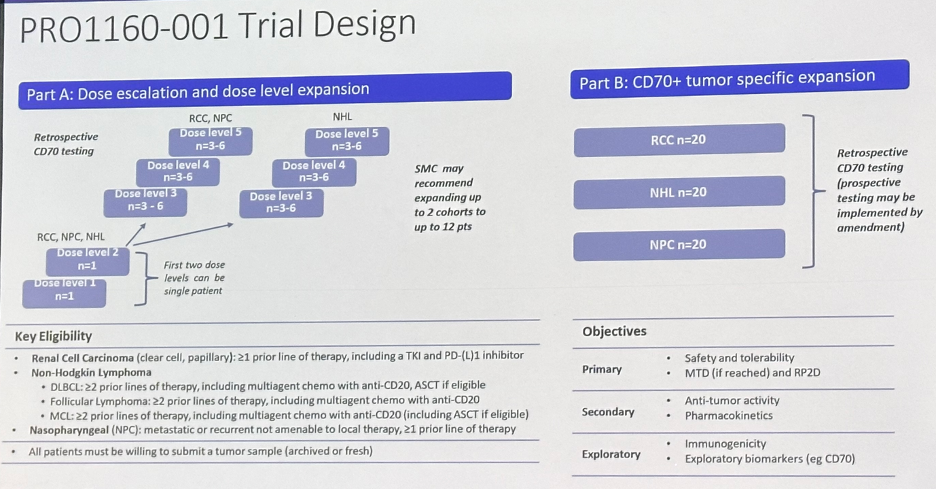
In conclusion, Dr. Vaishampayan summarized ongoing clinical trials in both the metastatic frontline and pre-treated setting, as well as in the localized disease perioperative setting:
- Frontline:
- Cytoreductive nephrectomy: PROBE S1931(SWOG)
- Clinical Trials with stereotactic body radiotherapy (SBRT): SOAR (ECOG/ACRIN) and SAMURAI (NRG)
- Response Adaptive Study: Alliance PDIGREE
- Belzutifan-based combination trial (NCT04736706): Triplet (belzutifan + pembrolizumab + quavonlimab) versus lenvatinib + pembrolizumab
- Randomized study of adding biotherapeutics to an immune-based regimen to potentially enhance immune therapy effect is proposed through SWOG
- Pre-treated:
- HIF-2 alpha inhibitors: belzutifan, NKT, ARO-HIF2, combination of belzutifan + lenvatinib versus cabozantinib
- Novel immune therapies: ONC-392, SRK-181 (TGF beta inhibitor), Relatlimab (Lag-3 inhibitor), TIGIT, novel cytokines, STING, cellular therapies
- Novel VEGF-TKI: Zanzalintimab
- ADC-PRO1 160, the CD70 antibody with topoisomerase payload
- Perioperative
- Liquid biopsy biomarkers/minimal residual disease
- Neoadjuvant belzutifan versus pembrolizumab versus combination
- LITESPARK022: Adjuvant study of belzutifan versus pembrolizumab + belzutifan
Presented by: Ulka N. Vaishampayan, MBBS, Professor, Department of Internal Medicine, Division of Hematology and Oncology, University of Michigan Ann Arbor, MI
Written by: Rashid K. Sayyid, MD, MSc – Society of Urologic Oncology (SUO) Clinical Fellow at The University of Toronto, @rksayyid on Twitter during the 2023 Society of Urologic Oncology (SUO) annual meeting held in Washington, D.C. between November 28th and December 1st, 2023
References:- Choueiri TK, Bauer TM, Papadopoulos KP, et al. Inhibition of hypoxia-inducible factor-2α in renal cell carcinoma with belzutifan: a phase 1 trial and biomarker analysis. Nat Med 2021;27(5):802-805.
- Jonasch E, Donskov F, Iliopoulos O, et al. Belzutifan for Renal Cell Carcinoma in von Hippel–Lindau Disease. N Engl J Med. 2021;385:2036-2046.


